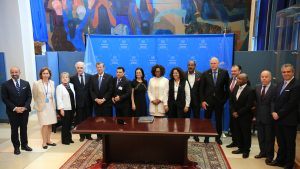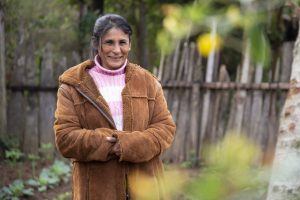Environmental Democracy: Where Open Government and the Escazu Agreement Meet
Democracia ambiental: un punto de encuentro entre gobierno abierto y el Acuerdo Escazú
In 2018, 22 countries from Latin America and the Caribbean reached a historical milestone in environmental democracy by signing the Escazu Agreement. In 2020, 20 countries have ratified the treaty and one more ratification is missing to make this a reality. The Open Government PartnershipThe Open Government Partnership (OGP) is a multi-stakeholder initiative focused on improving government transparency, ensuring opportunities for citizen participation in public matters, and strengthen... More (OGP) is uniquely positioned to convene stakeholders and advance the principles of access to information, participation and justiceTo address barriers that prevent citizens from having their justice needs met, OGP participating governments are working to expand transparency, accountability, and inclusion into all systems of justi... in environmental matters, as the Escazu Agreement advocates for. Synergies between the two initiatives are the key to implement the Escazu Agreement for three main reasons:
1. Citizens are at the heart of democracy
Both OGP and the Escazu Agreement are based on the premise that the active participation of multiple stakeholders in decision-making processes is a cornerstone of strong democracies and of their ability to achieve governability and social peace. This is increasingly important in a context where these pillars are jeopardized by populism, social inequity and environmental degradation.
2. Multilateralism strengthens collaboration
Both initiatives (a global, voluntary initiative, and a regional, binding treaty) deeply believe in and practice multilateralism and understand that addressing the complex challenges that countries are facing collaboratively and collectively will bring about better results than by promoting solely national-level dialogue.
3. Focus on implementation
Both seek the effective implementation of transparencyAccording to OGP’s Articles of Governance, transparency occurs when “government-held information (including on activities and decisions) is open, comprehensive, timely, freely available to the pub... More, access to information, public participationGiving citizens opportunities to provide input into government decision-making leads to more effective governance, improved public service delivery, and more equitable outcomes. Technical specificatio..., and accountability, with the ultimate goal to ensure that people have the opportunity to exercise these rights.
These synergies represent a unique opportunity for countries in the region to leverage the OGP structure to identify context-specific challenges and therefore implement the Agreement.
Challenges
An ongoing research project conducted by The Access Initiative and the World Resources Institute highlights that citizens, especially the most vulnerable groups, face barriers to exercise their rights to information, participation and justice, including technical language, poverty, insufficient and inefficient participation mechanisms, difficulty accessing information, among others.
It also shows that there is no direct relation between legal frameworks and the effective implementation of these rights. Some norms establish sound standards, but fail to be implemented; some norms set low standards but can be easily ignored by future governments, as they are voluntary. Therefore, citizens cannot fully exercise these rights.
Eleven ratifications are needed for the Agreement to enter into force, and OGP represents an opportunity to promote its ratification.
Opportunities
Today, the 33 countries of Latin America and the Caribbean have the opportunity of being a party to the Agreement. To date, 10 countries have ratified the agreement, including four OGP member countries. Eleven ratifications are needed for the Agreement to enter into force, and OGP represents an opportunity to promote its ratification.
The Escazu Agreement must be seen as a tool to address all environmental matters, from local recycling programs to participation in the drafting of Climate Change Acts. It can be used as a benchmark to strengthen the development and implementation of environmental democracy commitments of the OGP process. For instance, as part of its OGP action plan, Uruguay developed its National Water Plan through a transparent inter-governmental process, with meaningful participation from multiple groups. They also implemented a campaign to raise awareness and build capacities around the use and care for water. The IRM highlighted that the participatory nature of this plan was key to the potential impact in water management. However, it recommended broadening the scope of participation. Taking the Agreement as a benchmark, the commitmentOGP commitments are promises for reform co-created by governments and civil society and submitted as part of an action plan. Commitments typically include a description of the problem, concrete action... could have benefited from the inclusionOGP participating governments are working to create governments that truly serve all people. Commitments in this area may address persons with disabilities, women and girls, lesbian, gay, bisexual, tr... More of vulnerable groups and by incorporating a long-term vision and strategic engagement with key stakeholders.
The Agreement can be used as a benchmark to strengthen the development and implementation of environmental democracy commitments of the OGP process.
Finally, OGP is a key platform to coordinate and foster the implementation of the Agreement, and broaden its reach. In its OGP action planAction plans are at the core of a government’s participation in OGP. They are the product of a co-creation process in which government and civil society jointly develop commitments to open governmen..., Ecuador proposed a strategy to implement the Escazu Agreement, becoming one of the first to conduct a political, legal, and institutional analysis to define potential gaps in the Agreement, and later on proposed a governance model to define how the different stakeholders will work together to support its implementation. The IRM recommended clarifying the role of the observatory in terms of monitoring of information published under the Agreement and its ability to influence the implementation of the Agreement through early warning systems.
There are clear synergies between OGP and the Escazu Agreement, and the region is committed to advance sustainable development and environmental affairs (with over 20 commitments included in the two latest action plan cycles). With one more country to ratify the Agreement before being able to host the first Conference of the Parties, now is the time for the OGP community, governments and civil society to leverage the opportunity and face challenges related to access, participation and justice in environmental matters in Latin America and the Caribbean.
En 2018, 22 países de América Latina y el Caribe marcaron un hito histórico en la democracia ambiental con la firma del Acuerdo Escazú. En 2020, 10 países han ratificado el tratado y sólo una ratificación más se interpone entre la aspiración y la acción. La Alianza para el Gobierno Abierto (OGP por sus siglas en inglés) tiene una posición privilegiada para convocar voluntades y avanzar los principios de acceso a la información, participación y justicia en asuntos ambientales que promueve el Acuerdo Escazú. La sinergia entre ambas iniciativas es la fórmula perfecta para lograr la implementación del Acuerdo por tres razones principales:
1. La ciudadanía al centro de la democracia
Tanto OGP como el Acuerdo de Escazú parten de la premisa que la participación activa de diversos actores de la sociedad en la toma de decisiones es una condición fundamental para fortalecer nuestras democracias y lograr niveles de gobernabilidad y de paz social adecuados. Esto cobra aún más fuerza hoy cuando estas bases están abiertamente amenazadas por el populismo, la inequidad social y el deterioro del medio ambiente, entre otras causas.
2. El multilateralismo fortalece la colaboración
Ambas iniciativas creen profundamente y practican el multilateralismo (una global de carácter voluntaria y otra regional y de carácter vinculante) y entienden que abordar los complejos desafíos de nuestros países en forma colaborativa y colectiva, logra mejores resultados que sólo restringiendo el diálogo a nivel nacional.
3. El fundamental foco en la implementación
Ambos buscan una efectiva y plena implementación de la transparencia, la información, la participación y la rendición de cuentas, declarando entonces que lo fundamental al final del día es que las personas tengan posibilidades reales de ejercer estos derechos.
Estas sinergias presentan una oportunidad única para que los países de la región aprovechen la estructura de OGP para identificar los retos específicos a su contexto y puedan implementar el Acuerdo.
Retos
Una investigación en curso llevada a cabo por la Iniciativa de Acceso y el Instituto de Recursos Mundiales destaca que las personas, especialmente de los grupos más vulnerables, enfrentan diversas barreras para ejercer sus derechos de acceso a la información, participación y justicia. Entre ellas: lenguaje técnico, pobreza, escasos e ineficientes mecanismos de participación, dificultad para acceder a la información, entre otras.
También muestra que no hay una relación directa entre marcos legales y la implementación efectiva de estos derechos. Hay normas con un buen estándar pero que no se implementan; hay normas con un bajo estándar que se implementan pero al ser prácticas voluntarias pueden ser fácilmente descontinuadas al cambiar autoridades y la ciudadanía no logra un ejercicio efectivo de estos derechos.
OGP puede ofrecer la oportunidad para impulsar la ratificación del Acuerdo.
Oportunidades
Hoy, los 33 países de América Latina y el Caribe tienen la posibilidad de ser Estados Parte del Acuerdo al adscribir. A la fecha 10 países lo han ratificado, 4 de ellos miembros de OGP. Se requieren 11 ratificaciones para que entre en vigor, por lo que OGP puede ofrecer la oportunidad para impulsar la ratificación del Acuerdo.
El Acuerdo de Escazú debe considerarse como una herramienta para abordar cualquier asunto ambiental, desde un programa de reciclaje hasta la elaboración de una la Ley de Cambios Climático. El Acuerdo se puede utilizar como referencia para fortalecer la construcción e implementación de compromisos de democracia ambiental en el marco de OGP. Por ejemplo, Uruguay a través de su plan de acción de OGP, realizó un proceso intergubernamental transparente y con una participación incidente de diversos grupos para elaborar el Primer Plan Nacional del Agua, además de lanzar una campaña sobre el uso y el cuidado del agua. El Mecanismo de Revisión Independiente (IRM) destacó que el carácter participativo del desarrollo del plan de agua era significativo para tener un impacto en la cultura de manejo de aguas. No obstante, advirtió sobre la necesidad de ampliar el alcance de la participación. Tomando el Acuerdo como referencia, el compromiso se pudo haber reforzado con la inclusión de la participación de grupos en situación de vulnerabilidad hídrica y con la planificación del Plan con una mirada a largo plazo y de relación estratégica con los diversos actores.
El Acuerdo se puede utilizar como referencia para fortalecer la construcción e implementación de compromisos de democracia ambiental en el marco de OGP.
Finalmente, OGP sirve como plataforma para coordinar e impulsar las rutas de implementación del Acuerdo y ampliar su alcance. En su plan de acción de OGP, Ecuador propuso iniciar una estrategia para la implementación del Acuerdo de Escazú, siendo una de las primeras acciones el análisis político, legal e institucional para definir eventuales brechas con el contenido del Acuerdo y la definición de un observatorio ambiental para determinar los roles de los diversos actores en el acompañamiento de su implementación. El IRM recomendó especificar las funciones del observatorio en cuanto al monitoreo de la información publicada bajo el marco del Acuerdo y su capacidad de incidir en el cumplimiento de la implementación del Acuerdo con el establecimiento de mecanismos de alerta temprana.
Las sinergias entre OGP y el Acuerdo de Escazú son evidentes. Es también claro el compromiso de la región por avanzar en temas de desarrollo sostenible y medio ambiente (con más de 20 compromisos sobre el tema en los últimos dos ciclos de planes de acción). A la espera de que tan solo un país ratifique el Acuerdo para organizar la Primera Conferencia de las Partes del Acuerdo de Escazú, este es el momento indicado para que la comunidad OGP, gobiernos y sociedad civil aprovechen la oportunidad para enfrentar los desafíos en materia de derechos de acceso, participación y justicia en asuntos ambientales en América Latina y el Caribe.
No comments yet
Related Content

IRM Week: A Year in Review
Explore webinars, blogs and fact sheets that spotlight new IRM findings, highlight action plan success stories and reforms that have gained traction, and discuss existing challenges and opportunities.
 Challenges and Solutions
Challenges and Solutions
Synergies Between the Escazú Agreement and Open Government to Strengthen Environmental Democracy in the Americas

What’s in the 2019 Action Plans
Explore commitments OGP members made in their 2019 action plans, including commitments to watch in each of the eight focus policy areas in OGP’s three year strategy.


Leave a Reply